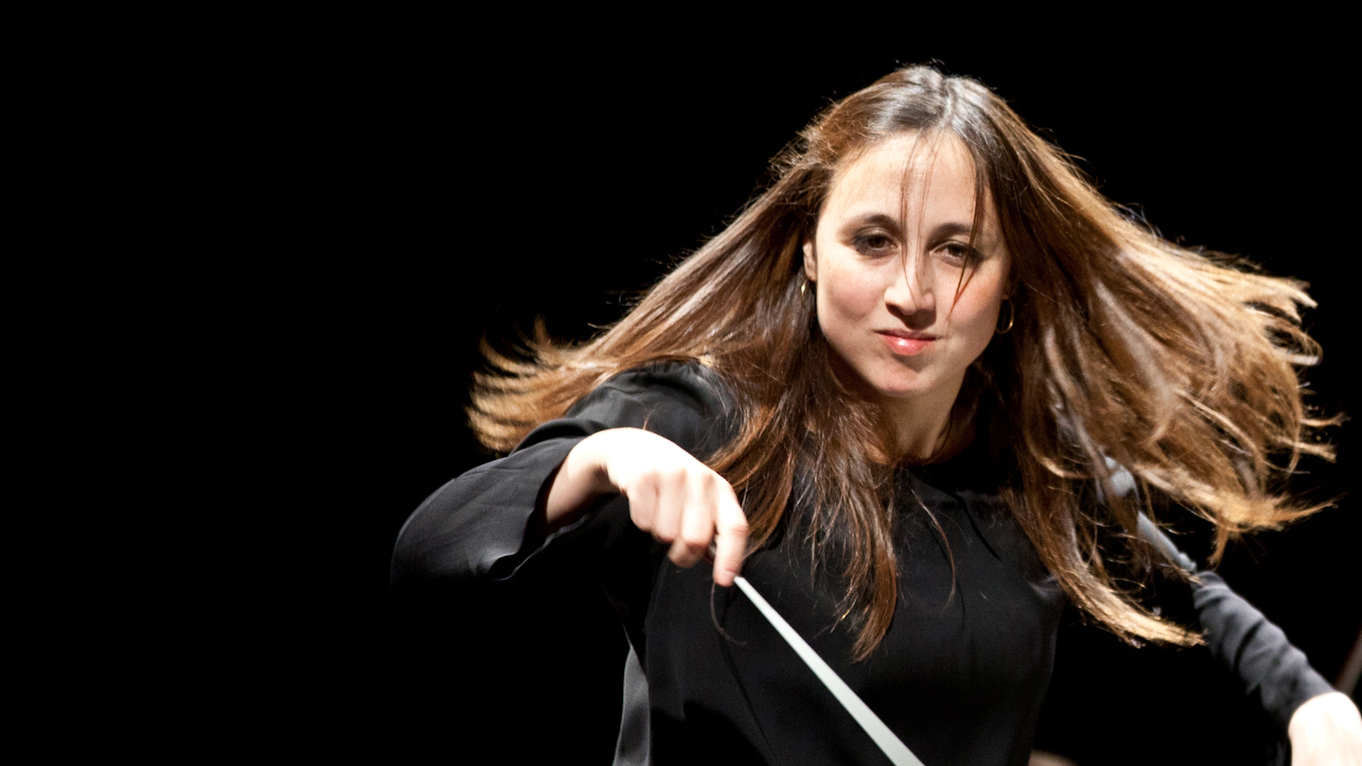On her long-anticipated visit, Joana Carneiro conducts a symphony that challenges the view of her composer as a cantankerous master. Richard Wagner referred to Beethoven’s Seventh Symphony as the apotheosis of the dance. Magnus Lindberg contributes towards deconstructing the myth. Absence was inspired by Beethoven’s conversation books, in which everyday notes about financial matters mix with sublime philosophical themes.
Pianist Aleksander Melnikov is recognised as a musician whose insight penetrates beyond the surface of the pieces he performs.
Joana Carneiro
Portuguese conductor Joana Carneiro sang in choirs as a child, graduated in viola and piano, but knew when she was only nine that she one day wanted to be a conductor. She nevertheless studied medicine for two years along the way. She was one of the three conductors chosen for London’s Allianz Cultural Foundation International Conductors Academy following her success in the 2002 Maazel-Vilar Conductor’s Competition, and after three years with the Los Angeles Philharmonic Orchestra was invited to be official guest conductor of the Gulbenkian Orchestra. Succeeding Kent Nagano as Music Director of the Berkeley Symphony, she was then Chief Conductor of Portugal’s National Orchestra 2014–2022 and is now Principal Guest Conductor of the Real Filharmonia de Galicia. Joana Carneiro last conducted the HPO in 2014, in a programme of Brahms and Beethoven. She has conducted works by Magnus Lindberg with, among others, the BBC Scottish Symphony Orchestra, and with the Los Angeles Philharmonic at the Hollywood Bowl, to an audience of over 7,500.
Alexander Melnikov
Winner of numerous prestigious disc awards and other distinctions, Alexander Melnikov (born in Russia in 1973) is one of the most celebrated pianists in the world today. He feels a special affinity for the music of Rachmaninov. His recording of Rachmaninov’s devilishly difficult Op. 39 Etudes (Harmonia Mundi, 2007) has won unanimous acclaim from critics and audiences alike, and his disc of Shostakovich’s Preludes and Fugues was named in 2011 as one of the “50 Greatest Recordings of All Time” by the BBC Music Magazine. In 1991, he chose the Paganini Rhapsody to be heard tonight for the finals of the Queen Elisabeth Competition in Brussels. Melnikov is also known for his varied, sometimes surprising programming combining period styles with Russian music. In his solo recitals he may play instruments dating from different eras to underline the ideals prevailing at the time the works were written. He is thus equally at home with Baroque and modern orchestras and was Artist in Association with the Tapiola Sinfonietta here in Finland from 2014 to 2019.
Magnus Lindberg: Absence
Magnus Lindberg, a leading contemporary Finnish composer, seeks in Absence to engage in dialogue with Ludwig van Beethoven. Anxious not to startle his older colleague or to be rejected, Lindberg chose to score his piece for an orchestra similar to that in most of the Beethoven symphonies. He did not, however, even attempt to produce a work in that composer’s style; this would, he said, be ridiculous. Instead, he chose to use a few quotations, rather as if to seek the maestro’s advice: what exactly did he mean by this or that, and how should it be interpreted? The quotations are bar 11 of the slow movement of the piano sonata Les Adieux, the rising, octave-spanning chromatic line at the end of the first movement of the second symphony, and the opening chord of the finale of the ninth symphony. The language of the conversation in this piece premiered in 2020 is music, and the modern “dissonances” speak for themselves.
Sergei Rachmaninov: Paganini Rhapsody
The last of the great ‘Romantics’, Sergei Rachmaninov (1873–1943) was both a composer and a highly successful pianist – a fact that some had difficulty condoning. Rather than subscribing to the cold, down-to-earth trend – Neoclassicism – of his day, Rachmaninov the composer preferred to look back to the warm sentimentality of the past. Not until the 1950s did the world really come to appreciate his music.
The Paganini Rhapsody of 1934 is based on Paganini’s Caprice in A minor for solo violin. Consisting of 24 variations, it is a piano concerto in three movements performed without a break and quickly became one of Rachmaninov’s most popular works. It also served as the score for a ballet arranged by Rachmaninov himself and telling the story of Paganini’s life. Legend has it that Paganini sold his soul to the devil in order to perfect his playing and to attract the ladies. One of the Rhapsody’s motifs is therefore the medieval Dies irae (Day of Wrath) theme alluding to the devil, while variations 11–18, the slow movement, recall the fiddler’s amorous adventures. The last part pays homage to Paganini’s virtuosity and even the devil finally gets his due.
Ludwig van Beethoven: Symphony No. 7, Op. 92
Each of the nine symphonies by Ludwig van Beethoven (1770–1827) is unique. Wagner called the seventh “the apotheosis of dance”, though it later proved totally unsuitable for a ballet. It has been described by many as frenetic, energetic and “tuneful”, and all point out its march-like, dotted rhythms reminiscent of the funeral march in the Eroica. The symphony has no slow movement as such.
Beethoven began working on his 7th symphony in 1811, while seeking to ease his encroaching deafness at a spa. His mood was not helped by his financial worries and hapless love affairs, yet the symphony is full of fresh ideas and bursting with life. He conducted the premiere at a charity concert in Vienna given in aid of soldiers wounded in the Battle of Hanau in the final stages of the Napoleonic wars. The cognoscenti were totally baffled by what they heard and some, among them Friedrich Wieck (father of Clara Schumann) and Carl Maria von Weber the composer went so far as to reckon Beethoven was mad. Other members of the audience were entranced, however, and demanded a repeat of the second movement.

